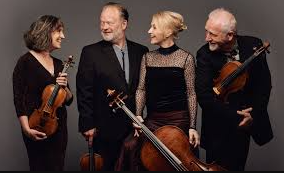
Long-standing ensemble delivers a varied and nuanced programme, highlighting their remarkable musical evolution
The Brodsky Quartet, one of the longest-standing ensembles in the classical world, delivered an exceptional performance at Kings Place, showcasing their unique style and impressive versatility. Founded in 1973, the quartet remains strong with its original violinist Iain Belton and cellist Jacqueline Thomas, alongside violist Paul Cassidy, who joined in 1982. New violinist Krysia Osostowicz, who joined in 2021, brings fresh energy while drawing from years of experience, adding a new layer to the ensemble’s already established dynamic.
Known for their genre-defying collaborations with artists like Elvis Costello and Björk, this concert was a return to their classical roots, offering a varied and engaging programme. The acoustics of Kings Place, with its wood-based design, provided a lively and transparent sound that suited the quartet’s bold, strongly accented style, making the audience feel as if the players were right in front of them.
In celebration of their 50th anniversary and Rachmaninov’s 150th, the quartet dedicated part of the performance to the composer’s rarely heard Two Movements for String Quartet. While Rachmaninov’s full intentions for the work remain unknown, the Brodskys’ rendition felt complete, with the second movement particularly standing out for its slow, meditative beauty. They also presented Rachmaninov’s Vocalise, reworked for string quartet by Cassidy, with the first violin embodying the evocative, smooth crooning reminiscent of a 1940s ballad.
The concert opened with Stravinsky’s Three Pieces, capturing the full spectrum of the composer’s wit, rhythmic drive, and melancholic depth. Similarly, Shostakovich’s Two Pieces for String Quartet demonstrated the group’s ability to shift from soulful to cartoonish with ease, playing up the humour and emotional complexity in the work.
Britten’s First String Quartet provided a major highlight, with the cello of Jacqueline Thomas shining through, especially in the opening movements, demonstrating the deep conversational qualities of the quartet. The piece was a showcase for the group’s ability to transition between intense moments of anger and rhythm-driven interplay, exploring sonic textures from plucked strings to smooth bowing.
The programme concluded with Debussy’s String Quartet, whose lush, warm textures seemed to encapsulate the Brodskys’ 50-year journey together. The wistful tones of Debussy’s work brought the concert to a bittersweet close, reminding the audience of the quartet’s enduring legacy. While their journey cannot last forever, this performance was a testament to the brilliance they continue to bring to the stage.









